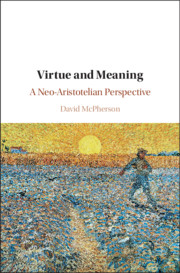Book contents
- Virtue and Meaning
- Virtue and Meaning
- Copyright page
- Dedication
- Contents
- Acknowledgments
- Introduction: Toward Re-Enchantment
- Chapter 1 The Human Form of Life
- Chapter 2 Virtue, Happiness, and Meaning
- Chapter 3 Other-Regarding Concern
- Chapter 4 Cosmic Outlooks
- Chapter 5 Homo Religiosus
- Conclusion
- References
- Index
Chapter 5 - Homo Religiosus
Published online by Cambridge University Press: 09 January 2020
- Virtue and Meaning
- Virtue and Meaning
- Copyright page
- Dedication
- Contents
- Acknowledgments
- Introduction: Toward Re-Enchantment
- Chapter 1 The Human Form of Life
- Chapter 2 Virtue, Happiness, and Meaning
- Chapter 3 Other-Regarding Concern
- Chapter 4 Cosmic Outlooks
- Chapter 5 Homo Religiosus
- Conclusion
- References
- Index
Summary
I explore the place of spirituality within a neo-Aristotelian ethical perspective. Among neo-Aristotelians this issue is often either ignored or excluded from consideration. I discuss why this is and also why it is problematic. More positively, I suggest how spirituality can play an important role in a neo-Aristotelian account of “the good life.” By “spirituality” I mean a practical life-orientation that is shaped by what is taken to be a self-transcending source of meaning, which involves strong normative demands, including demands of the sacred or the reverence-worthy. I argue that through an exploration of the strong evaluative standpoint from within our human form of life as meaning-seeking animals we can come to appreciate better the importance of spirituality for human beings throughout recorded history and why we can be described as homo religiosus. In addition, I argue against the anti-contemplative stance of many neo-Aristotelians and for the integral importance of contemplation for human life, and for the spiritual life in particular. I also discuss the draw of theistic spirituality, even though my account allows for both theistic and non-theistic forms of spirituality.
Keywords
- Type
- Chapter
- Information
- Virtue and MeaningA Neo-Aristotelian Perspective, pp. 150 - 193Publisher: Cambridge University PressPrint publication year: 2020



